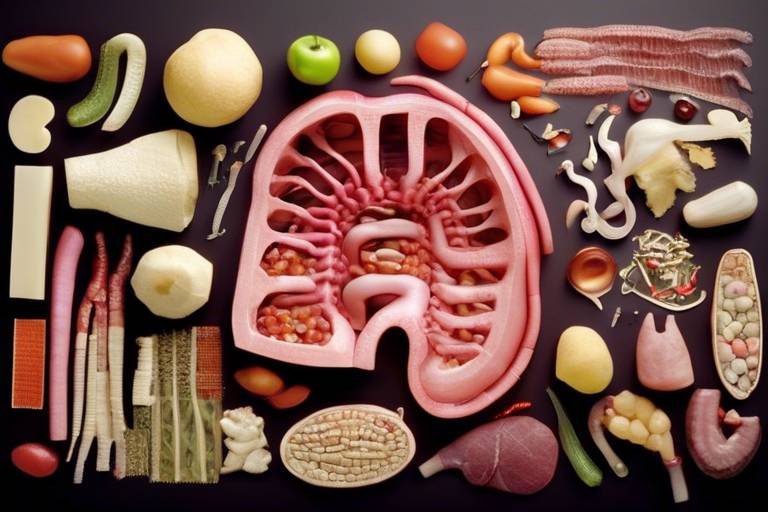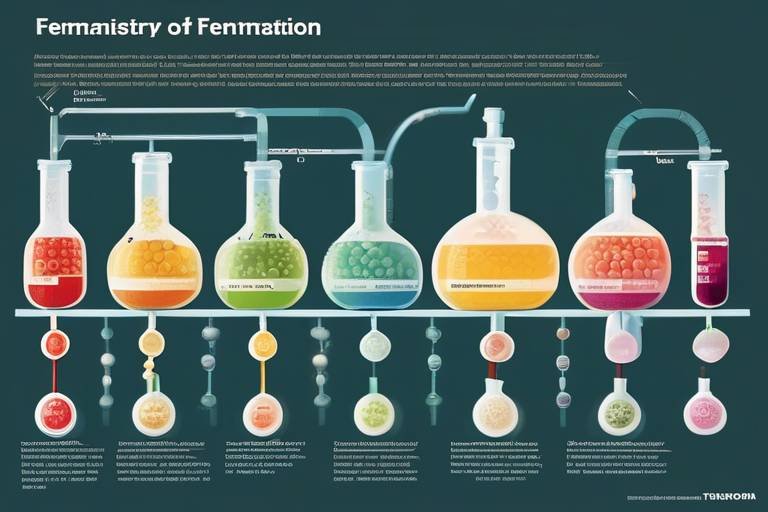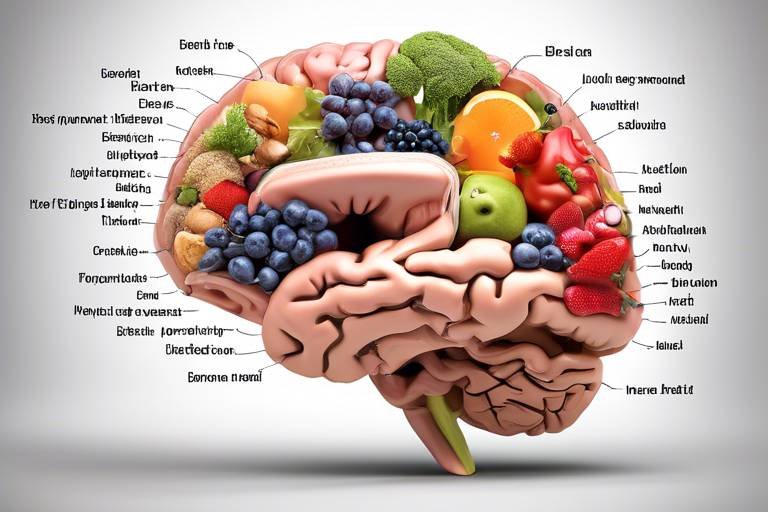The Biology of Heart Disease - Prevention and Care
Heart disease is often described as a silent killer, lurking in the shadows of our everyday lives. It’s a complex condition that doesn't just happen overnight; it develops gradually, often without noticeable symptoms until it's too late. Understanding the biology behind heart disease is crucial for prevention and care. At its core, heart disease involves a series of biological processes that can lead to serious cardiovascular issues. From the buildup of plaque in arteries to the weakening of heart muscles, each step in this process is a call to action for those who want to maintain a healthy heart.
To break it down, heart disease encompasses a variety of conditions, including coronary artery disease, heart rhythm problems (arrhythmias), and heart defects. Each of these conditions has its own unique biological mechanisms. For instance, in coronary artery disease, the arteries that supply blood to the heart become narrowed due to plaque buildup, which can lead to heart attacks. Imagine your arteries as highways; when they become congested, traffic slows down, and in the case of your heart, this can lead to severe consequences.
But what causes these problems? It’s a mix of factors, including genetics, lifestyle choices, and environmental influences. Each of these plays a significant role in how our hearts function and how susceptible we are to heart disease. For instance, high blood pressure and high cholesterol can significantly damage blood vessels over time, leading to a cascade of biological changes that can result in heart disease. The good news is that many of these risk factors are modifiable, meaning we can take steps to improve our heart health.
In the following sections, we’ll dive deeper into the risk factors associated with heart disease, explore preventive measures, and discuss how to care for your heart effectively. By understanding the biology of heart disease, we empower ourselves to make informed choices that can lead to a healthier, longer life.
At the heart of heart disease is a complex interplay of biological systems. When we talk about the development of heart disease, we are referring to a variety of pathological processes. These include inflammation, oxidative stress, and the role of cholesterol. For example, when cholesterol levels become imbalanced, they can lead to the formation of plaques in the arteries. This process is often exacerbated by inflammation, which can cause further damage to the arterial walls, leading to a vicious cycle of deterioration.
Moreover, heart disease is not just a singular condition; it encompasses various forms, including:
- Coronary Artery Disease (CAD): The most common type, caused by the buildup of plaque in the coronary arteries.
- Heart Failure: A condition where the heart is unable to pump sufficiently to maintain blood flow to meet the body's needs.
- Arrhythmias: Abnormal heart rhythms that can lead to complications if not managed properly.
Understanding these conditions and their biological mechanisms is essential for prevention and treatment. Each type of heart disease may require different approaches to care, and recognizing the signs and symptoms early can make a significant difference in outcomes.
Identifying the major risk factors associated with heart disease is crucial for prevention and early intervention. These risk factors can be broadly categorized into genetic, lifestyle, and environmental influences.
Genetic factors play a significant role in heart disease susceptibility. If you have a family history of heart disease, it's important to be proactive about your heart health. Hereditary conditions can significantly influence your risk. For example, familial hypercholesterolemia is a genetic disorder that leads to high cholesterol levels from a young age. Understanding its impact is essential for early diagnosis and management.
This genetic disorder causes extremely high levels of LDL cholesterol, which can lead to early cardiovascular disease. If you suspect you may have this condition, genetic testing and counseling can provide valuable insights and help you manage your risk effectively.
Other genetic conditions, such as certain cardiomyopathies, can also increase heart disease risk. These conditions may not always present symptoms until later in life, making genetic counseling an important step for families with a history of heart issues.
Your lifestyle choices play a monumental role in determining your heart health. Factors such as diet, exercise, and smoking can significantly influence your risk of developing heart disease. For instance, a diet high in saturated fats, trans fats, and cholesterol can contribute to plaque buildup in the arteries. Conversely, a diet rich in fruits, vegetables, whole grains, and healthy fats can help protect your heart.
Regular physical activity is also essential for maintaining heart health. It strengthens the heart muscle, improves circulation, and can help lower blood pressure and cholesterol levels. The key is to find activities you enjoy, making it easier to stick with a regular exercise routine.
Effective prevention strategies, including lifestyle changes and medical interventions, can significantly reduce the risk of developing heart disease. It’s all about making informed choices that benefit your heart.
A heart-healthy diet is vital for prevention. Focus on incorporating:
- Fruits and vegetables
- Whole grains
- Lean proteins such as fish and poultry
- Healthy fats from sources like avocados and nuts
At the same time, it’s important to limit foods high in saturated fats, trans fats, and sodium. Think of your diet as a foundation for your heart health; the stronger the foundation, the less likely it is to crumble.
Regular physical activity is essential for heart health. Aim for at least 150 minutes of moderate aerobic exercise or 75 minutes of vigorous exercise each week. This can include activities like brisk walking, cycling, swimming, or even dancing. The benefits of exercise extend beyond just heart health; it can improve your mood, boost your energy levels, and enhance overall well-being.
Q: What are the early signs of heart disease?
A: Early signs can include chest pain, shortness of breath, fatigue, and irregular heartbeats. It's important to consult a healthcare professional if you experience any of these symptoms.
Q: Can heart disease be reversed?
A: While some damage may be irreversible, many individuals can significantly improve their heart health through lifestyle changes, medication, and regular monitoring.
Q: How often should I get my cholesterol checked?
A: It's generally recommended to have your cholesterol levels checked every four to six years, but more frequent testing may be necessary if you have risk factors for heart disease.

Understanding Heart Disease
Heart disease is not just one condition; it's a broad term that encompasses various cardiovascular issues that can affect the heart and blood vessels. Understanding the biology behind heart disease is crucial for recognizing how it develops and the potential consequences it can have on our health. At its core, heart disease often stems from a combination of factors that disrupt the normal functioning of the heart. These can include issues such as atherosclerosis, where plaque builds up in the arteries, narrowing them and restricting blood flow. Imagine your arteries as highways for blood; when they get clogged, traffic jams occur, leading to serious consequences.
There are several types of heart disease, each with its unique characteristics and implications. Some of the most common types include:
- Coronary Artery Disease (CAD): This is the most prevalent type and occurs when the coronary arteries become narrowed or blocked, often due to plaque accumulation.
- Heart Attack: A heart attack occurs when blood flow to a part of the heart is blocked, causing damage to the heart muscle.
- Heart Failure: This condition arises when the heart cannot pump enough blood to meet the body's needs, leading to fatigue and fluid retention.
- Arrhythmias: These are irregular heartbeats that can affect how well the heart pumps blood.
The biological mechanisms behind these conditions are complex. They often involve a combination of inflammation, oxidative stress, and changes in blood flow. For instance, during a heart attack, the sudden blockage of blood flow can lead to irreversible damage to the heart muscle. Think of it like a factory that suddenly loses power; the machines stop working, and production halts. Similarly, when the heart is deprived of oxygen-rich blood, it can't function properly, leading to severe health consequences.
Moreover, heart disease can also result from structural abnormalities in the heart itself. Congenital heart defects, for example, are conditions that individuals are born with, affecting the heart's structure and function. These defects can range from simple issues, like a small hole in the heart, to more complex problems that require surgical intervention.
In summary, understanding heart disease involves recognizing its various forms and the biological processes that contribute to its development. By doing so, we can better appreciate the importance of prevention and early intervention. The more we know about our hearts and how they work, the better equipped we are to take care of them. After all, our heart is the engine that keeps us going, and it's essential to keep it in top shape!

Risk Factors for Heart Disease
Heart disease is a complex condition influenced by a myriad of factors, and understanding these risk factors is crucial for effective prevention and early intervention. It's like piecing together a puzzle; each piece represents a different aspect of our lifestyle, genetics, and environment that can contribute to heart health. When we talk about risk factors, we can categorize them into three main areas: genetic predispositions, lifestyle choices, and environmental influences.
First, let’s dive into the genetic predispositions. Genetics can often feel like a double-edged sword; while we can't change our genes, understanding them can empower us to take proactive steps. Some individuals may inherit conditions that predispose them to heart disease. For instance, familial hypercholesterolemia is a hereditary disorder that results in extremely high levels of cholesterol, leading to an increased risk of heart disease at an early age. Recognizing such genetic markers can be pivotal for early diagnosis and management.
Aside from familial hypercholesterolemia, there are various other genetic conditions that can elevate heart disease risk. These include conditions such as hypertrophic cardiomyopathy and Marfan syndrome. Each of these conditions carries its own unique set of risks, and genetic counseling can be a valuable resource for those with a family history of heart issues. Understanding your genetic background is like having a roadmap; it can guide you in making informed health decisions.
Familial hypercholesterolemia is particularly concerning because it often goes undiagnosed until serious complications arise. Those affected may not exhibit symptoms until they experience a heart attack or other cardiovascular events. Therefore, awareness and screening for this condition can be lifesaving. If you suspect that high cholesterol runs in your family, it’s wise to consult a healthcare provider for a lipid panel and further testing.
In addition to familial hypercholesterolemia, other genetic conditions can also play a significant role. For example, Long QT syndrome can lead to dangerous heart rhythms, while congenital heart defects can be present at birth and require ongoing management. It’s essential to recognize these conditions and their implications for heart health, making genetic counseling a key aspect of preventative care.
Now, let’s pivot to lifestyle choices, which arguably have the most significant impact on heart health. The adage “you are what you eat” rings particularly true when it comes to cardiovascular health. Poor dietary habits, such as consuming excessive amounts of saturated fats, trans fats, and sugars, can lead to obesity, hypertension, and ultimately heart disease. But it’s not just what’s on your plate; physical inactivity plays a major role too. Think of your heart as a muscle that needs regular exercise to stay strong. Incorporating physical activity into your daily routine can reduce the risk of heart disease significantly.
Moreover, smoking is another critical lifestyle factor that dramatically increases the risk of heart disease. It’s like throwing gasoline on a fire; it exacerbates existing health issues and creates new ones. Quitting smoking can reverse many of the risks associated with heart disease, making it one of the most impactful changes someone can make for their health.
Environmental influences also cannot be ignored. Factors such as exposure to pollution, high-stress levels, and socioeconomic status can all contribute to heart disease risk. Living in an area with high air pollution, for instance, can increase the likelihood of heart problems, much like how a fish struggles to thrive in polluted water.
In summary, the road to heart health is multifaceted, with genetics, lifestyle choices, and environmental factors all playing a significant role. By understanding these risk factors, we can take proactive measures to safeguard our heart health. It’s all about making informed choices and seeking guidance when necessary.
Q: Can heart disease be hereditary?
A: Yes, genetic factors can significantly influence the risk of heart disease. Conditions like familial hypercholesterolemia are examples of hereditary risks.
Q: What lifestyle changes can help reduce the risk of heart disease?
A: Adopting a heart-healthy diet, engaging in regular physical activity, quitting smoking, and managing stress are all effective strategies for reducing heart disease risk.
Q: How often should I get screened for heart disease?
A: It's recommended to discuss your individual risk factors with a healthcare provider, who can suggest appropriate screening intervals based on your health history.

Genetic Predispositions
When we talk about heart disease, it's essential to recognize that our genetic makeup plays a significant role in our susceptibility to various cardiovascular conditions. Just like a recipe that requires specific ingredients, our genes can either enhance or diminish our heart health. For some, a family history of heart disease can feel like a ticking time bomb, waiting to go off. But understanding these genetic predispositions can empower us to take proactive steps toward prevention.
Genetic factors can influence heart disease in several ways. For instance, certain hereditary conditions can lead to abnormalities in how our bodies process cholesterol and fats, which are crucial for maintaining healthy arteries. This is where conditions like Familial Hypercholesterolemia come into play. Individuals with this genetic disorder often have elevated cholesterol levels from a young age, significantly increasing their risk of developing heart disease if left unmanaged.
But Familial Hypercholesterolemia isn't the only genetic condition that can impact heart health. There are various other genetic factors that contribute to the risk of heart disease, including:
- Hypertrophic Cardiomyopathy: A condition that causes the heart muscle to thicken, potentially leading to heart failure.
- Long QT Syndrome: An inherited disorder that can cause fast, chaotic heartbeats, increasing the risk of sudden cardiac arrest.
- Marfan Syndrome: A connective tissue disorder that can affect the heart's valves and aorta, leading to serious complications.
Understanding these conditions is critical for early diagnosis and management. Genetic counseling can be a valuable resource for individuals with a family history of heart disease, helping them navigate their risks and make informed decisions about their health. It’s like having a personal trainer for your genes—someone who can guide you through the minefield of your genetic predispositions and help you develop a tailored plan to mitigate risks.
It's important to remember that while genetics plays a significant role, it’s not the only factor at play. Lifestyle choices, environmental influences, and other health conditions can interact with our genetic predispositions to either exacerbate or alleviate the risk of heart disease. The key takeaway here is that awareness is power; knowing your family history and discussing it with a healthcare provider can lead to early interventions that significantly improve heart health outcomes.

Familial Hypercholesterolemia
Familial hypercholesterolemia (FH) is a genetic disorder that significantly impacts cholesterol levels in the body. Imagine your body as a finely tuned machine, where cholesterol is a crucial component. In individuals with FH, this machine runs on an excess of cholesterol, leading to a range of health complications, particularly cardiovascular disease. This condition is often inherited in an autosomal dominant pattern, meaning that just one copy of the mutated gene from a parent can cause the disorder. It’s like inheriting a faulty blueprint that leads to a structure that’s prone to collapse.
Individuals with FH typically have very high levels of low-density lipoprotein (LDL) cholesterol, often referred to as "bad" cholesterol. This can lead to the buildup of fatty deposits in the arteries, increasing the risk of heart attacks and strokes at a much younger age than the general population. In fact, those with FH can have cholesterol levels that are two to three times higher than normal, making early detection and management critical.
Understanding the implications of familial hypercholesterolemia is essential for effective intervention. Early diagnosis is key, and it often involves a combination of family history assessments, physical examinations, and blood tests to measure cholesterol levels. Individuals may also undergo genetic testing to confirm the diagnosis. The earlier you catch it, the better the chances of managing the condition effectively.
Management of FH typically includes lifestyle modifications and medical interventions. A heart-healthy diet is paramount; think of it as giving your machine the right fuel. Foods rich in omega-3 fatty acids, fiber, and antioxidants can help mitigate some of the risks associated with high cholesterol levels. On the flip side, it’s crucial to avoid trans fats, sugary snacks, and excessive saturated fats, which can exacerbate the problem.
Moreover, medications such as statins are often prescribed to help lower cholesterol levels. These medications work by blocking a substance your body needs to make cholesterol, effectively reducing the amount of cholesterol in your blood. It's like putting a cap on the flow of excess oil into a machine, preventing it from becoming clogged and malfunctioning.
In summary, familial hypercholesterolemia is a serious condition that requires awareness and proactive management. Understanding its genetic basis, recognizing the symptoms, and implementing lifestyle changes can significantly improve outcomes for those affected. If you suspect you or a family member may have FH, consulting with a healthcare provider for a thorough evaluation is essential.
- What are the symptoms of familial hypercholesterolemia? Symptoms may include early heart disease, cholesterol deposits in tendons and skin, and high cholesterol levels in blood tests.
- How is familial hypercholesterolemia diagnosed? Diagnosis typically involves a combination of family history, cholesterol level tests, and possibly genetic testing.
- Can familial hypercholesterolemia be treated? Yes, it can be managed through lifestyle changes and medications like statins to lower cholesterol levels.
- Is familial hypercholesterolemia common? It is estimated to affect about 1 in 250 people, making it a relatively common genetic disorder.

Other Genetic Conditions
While familial hypercholesterolemia is one of the most recognized genetic disorders linked to heart disease, there are numerous that can increase the risk of cardiovascular issues. These conditions often go unnoticed until they manifest as serious health problems, making awareness and early detection crucial. Understanding these genetic factors can empower individuals to take proactive steps in managing their heart health.
One such condition is hypertrophic cardiomyopathy (HCM), a genetic disorder characterized by the thickening of the heart muscle. This thickening can obstruct blood flow and lead to serious complications, including arrhythmias and sudden cardiac arrest. HCM often runs in families, and individuals with a family history of the condition should consider genetic screening and regular check-ups with a cardiologist.
Another important genetic condition is arrhythmogenic right ventricular cardiomyopathy (ARVC). This disorder primarily affects the heart's right ventricle, leading to abnormal heart rhythms. Similar to HCM, ARVC is inherited and can be difficult to diagnose without genetic testing. Individuals with ARVC may experience symptoms such as palpitations, dizziness, or even fainting spells, which should not be ignored.
Additionally, conditions like Marfan syndrome and Ehlers-Danlos syndrome can also have significant cardiovascular implications. Marfan syndrome, a connective tissue disorder, can lead to aortic dilation and dissection, while Ehlers-Danlos syndrome can cause vascular complications. Individuals with these syndromes must work closely with healthcare providers to monitor their heart health regularly.
In general, genetic counseling is highly recommended for individuals with a family history of heart disease or any of these genetic conditions. A genetic counselor can provide valuable insights and help families understand their risks, as well as the options available for monitoring and managing heart health.
In summary, being aware of these other genetic conditions and their implications for heart health is essential. Early diagnosis and intervention can make a significant difference in outcomes, allowing individuals to lead healthier lives while managing their genetic predispositions effectively.
- What are the signs of genetic heart conditions? Symptoms can vary widely, but common signs include chest pain, shortness of breath, palpitations, and fainting. It's crucial to consult a healthcare professional if you experience these symptoms.
- How can I find out if I have a genetic predisposition to heart disease? Genetic testing and counseling can help identify your risk factors. If you have a family history of heart disease, discussing this with your doctor is a good starting point.
- Are there lifestyle changes that can help mitigate genetic risks? Absolutely! Maintaining a healthy diet, engaging in regular physical activity, and avoiding tobacco can significantly reduce the risk of heart disease, even for those with genetic predispositions.
- What role does family history play in heart disease? Family history is a significant risk factor for heart disease. If close relatives have experienced heart issues, it's essential to be vigilant about your heart health and discuss this with your healthcare provider.

Lifestyle Choices
When it comes to heart health, the choices we make every day can either be our best friends or worst enemies. Think of your body as a finely tuned machine; if you fuel it with the right ingredients and maintain it properly, it will run smoothly for years to come. On the flip side, neglecting your health can lead to a host of problems, including heart disease. So, what are these lifestyle choices that can significantly impact your heart health? Let’s dive in!
First off, let's talk about diet. The food you consume plays a pivotal role in determining your cardiovascular health. A diet rich in fruits, vegetables, whole grains, and lean proteins can work wonders for your heart. On the other hand, indulging in processed foods, sugary snacks, and excessive saturated fats can lead to high cholesterol and increased blood pressure. To help you visualize this, consider the following table that outlines heart-healthy foods versus those to avoid:
| Heart-Healthy Foods | Foods to Avoid |
|---|---|
| Fruits and Vegetables | Processed Snacks |
| Whole Grains | White Bread and Pasta |
| Lean Proteins (like fish and chicken) | Red Meat and Processed Meats |
| Nuts and Seeds | Sugary Drinks |
Now, let’s not forget about the importance of exercise. Engaging in regular physical activity is like giving your heart a workout; it strengthens the heart muscle, improves circulation, and can help maintain a healthy weight. Whether it's a brisk walk, cycling, or even dancing, finding an activity you enjoy makes it easier to stick with it. Aim for at least 150 minutes of moderate aerobic exercise each week. Remember, consistency is key!
Moreover, managing stress is crucial. High stress levels can lead to unhealthy habits like overeating or smoking, which can, in turn, increase your risk for heart disease. Consider incorporating relaxation techniques into your routine, such as yoga, meditation, or even simple breathing exercises. These practices not only help in stress reduction but also promote overall well-being.
In summary, making conscious lifestyle choices is your best defense against heart disease. By adopting a heart-healthy diet, committing to regular physical activity, and managing stress effectively, you can significantly lower your risk. Remember, it's not just about making changes; it's about creating a sustainable lifestyle that prioritizes your heart health.
Frequently Asked Questions
- What are the best foods for heart health? Foods rich in omega-3 fatty acids, fiber, and antioxidants, like salmon, oats, and berries, are excellent for heart health.
- How much exercise do I need for a healthy heart? Aim for at least 150 minutes of moderate-intensity aerobic exercise each week.
- Can stress really affect my heart? Yes, chronic stress can lead to unhealthy habits and increase the risk of heart disease.

Preventive Measures
When it comes to heart disease, prevention is not just a strategy; it’s a lifestyle. Imagine your heart as a finely tuned engine; if you neglect its maintenance, it might sputter or even break down. To keep your heart running smoothly, there are several effective preventive measures that you can adopt. These measures not only help in lowering the risk of developing heart disease but also promote overall well-being. Let’s dive into some of the key strategies that can make a significant difference in your heart health.
First and foremost, dietary choices play a critical role in heart health. A heart-healthy diet is rich in fruits, vegetables, whole grains, and lean proteins while being low in saturated fats, trans fats, cholesterol, and sodium. Think of your plate as a canvas; the more colorful and varied your meals, the better it is for your heart. Foods such as berries, leafy greens, nuts, and fatty fish like salmon are not just delicious but are also packed with nutrients that support cardiovascular health. On the other hand, it’s essential to limit processed foods, sugary snacks, and excessive salt, as these can lead to high blood pressure and elevated cholesterol levels.
To illustrate this point, consider the following table that highlights some heart-healthy foods versus those to avoid:
| Heart-Healthy Foods | Foods to Avoid |
|---|---|
| Oats | White bread |
| Avocados | Processed meats |
| Fatty fish (like salmon) | Fried foods |
| Legumes | Candy and sugary drinks |
| Fruits and vegetables | High-sodium snacks |
In addition to dietary changes, regular physical activity is another cornerstone of heart disease prevention. Think of exercise as the oil that keeps your engine running smoothly. Engaging in at least 150 minutes of moderate aerobic activity each week can significantly improve your heart health. This could be as simple as brisk walking, cycling, or swimming. Not only does exercise help maintain a healthy weight, but it also lowers blood pressure, reduces bad cholesterol levels, and boosts your mood. So, whether it’s a dance class, a hike in nature, or a game of basketball with friends, find activities that you enjoy and make them a regular part of your life.
Lastly, don’t underestimate the importance of regular health check-ups. Monitoring your blood pressure, cholesterol levels, and blood sugar can provide you with crucial insights into your heart health. Early detection of any potential issues can lead to timely interventions, which can be lifesaving. Remember, being proactive is key! Always consult with healthcare professionals about your personal risk factors and strategies tailored to your needs.
In summary, preventing heart disease is all about making informed choices and adopting a holistic approach to health. By focusing on a balanced diet, staying active, and keeping up with regular check-ups, you can significantly enhance your heart health and overall quality of life.
- What are the first signs of heart disease? Common early signs can include chest pain, shortness of breath, fatigue, and irregular heartbeats.
- Can heart disease be reversed? While some damage may be permanent, lifestyle changes can significantly improve heart health and, in some cases, reverse certain conditions.
- How often should I get my heart checked? It’s advisable to have a check-up at least once a year, or more frequently if you have risk factors.
- Are there any supplements that can help heart health? Omega-3 fatty acids, CoQ10, and magnesium are often recommended, but always consult a healthcare provider before starting any new supplement.

Dietary Recommendations
When it comes to heart health, the saying "you are what you eat" couldn't be more accurate. A heart-healthy diet can significantly reduce the risk of heart disease and improve overall cardiovascular function. But what does that really mean? Essentially, it’s about making informed choices that nourish your body while keeping your heart in top shape. Imagine your heart as a finely tuned engine; the right fuel ensures it runs smoothly, while poor choices can lead to breakdowns.
First and foremost, incorporating a variety of fruits and vegetables into your daily meals is crucial. These foods are packed with vitamins, minerals, and antioxidants that help combat inflammation and oxidative stress, both of which are linked to heart disease. Aim for at least five servings a day. Think of colorful fruits and veggies as your heart’s best friends—each hue represents unique nutrients that contribute to heart health.
Next, consider the role of whole grains in your diet. Foods like brown rice, quinoa, and whole-grain bread are excellent sources of fiber, which can help lower cholesterol levels and maintain healthy blood pressure. Fiber acts like a broom for your digestive system, sweeping away excess cholesterol and keeping your arteries clear. In contrast, refined grains found in white bread and pastries can lead to spikes in blood sugar and increased heart disease risk.
Now, let’s talk about fats. Not all fats are created equal! While you might think all fats are bad, healthy fats from sources like avocados, nuts, and olive oil can actually benefit your heart. These monounsaturated and polyunsaturated fats help lower bad cholesterol levels and reduce inflammation. On the flip side, it’s essential to limit saturated fats and avoid trans fats found in many processed foods. Think of healthy fats as the good guys in your diet—supporting your heart rather than hindering it.
Protein is also a vital component of a heart-healthy diet. Opt for lean sources such as fish, poultry, beans, and legumes. Fatty fish like salmon and mackerel are especially beneficial due to their high omega-3 fatty acid content, which can lower triglycerides and decrease the risk of arrhythmias. Imagine these proteins as your heart’s building blocks, providing essential nutrients that keep it strong and resilient.
To illustrate the importance of these dietary choices, consider the following table that outlines foods to include and avoid:
| Foods to Include | Foods to Avoid |
|---|---|
| Fruits (berries, apples) | Processed snacks (chips, cookies) |
| Vegetables (leafy greens, broccoli) | Red and processed meats |
| Whole grains (brown rice, oats) | White bread and pasta |
| Healthy fats (olive oil, nuts) | Trans fats (margarine, fried foods) |
| Lean proteins (chicken, fish) | Sugary beverages |
Finally, staying hydrated is often overlooked but plays a significant role in heart health. Water helps maintain optimal blood volume and circulation. Aim for at least eight glasses a day, or more if you’re active. Think of hydration as the oil in your engine—essential for keeping everything running smoothly.
In summary, adopting a heart-healthy diet is not just about restriction; it’s about making positive choices that nourish your body and support your heart. By focusing on whole, nutrient-dense foods and avoiding harmful ingredients, you can significantly reduce your risk of heart disease and improve your overall health. Remember, every meal is an opportunity to fuel your heart—make it count!
- What are the best fruits for heart health? Berries, oranges, and apples are excellent choices due to their high antioxidant content.
- How much exercise do I need to maintain heart health? Aim for at least 150 minutes of moderate aerobic activity each week.
- Can I still eat my favorite foods? Moderation is key! You can enjoy your favorite foods occasionally while focusing on healthier choices most of the time.

Exercise and Physical Activity
When it comes to maintaining a healthy heart, are your best friends. Think of your heart as a muscle, much like the biceps you work on at the gym. Just as you wouldn’t expect to lift heavy weights without training, your heart also needs regular workouts to stay strong and efficient. Engaging in physical activity doesn’t just help your heart; it can also improve your overall mood, boost your energy levels, and even enhance your sleep quality. Isn’t that a sweet deal?
But how much exercise do you really need? The American Heart Association recommends at least 150 minutes of moderate aerobic activity or 75 minutes of vigorous activity each week. You might wonder, “What does that even look like?” Well, moderate activities include brisk walking or gardening, while vigorous activities could be jogging or cycling at a fast pace. The key is to find something you enjoy so you can stick with it long-term.
Incorporating physical activity into your daily routine doesn't have to be a chore. Here are some simple ways to get moving:
- Take the stairs instead of the elevator.
- Park farther away from your destination to increase your walking distance.
- Join a local sports team or class that interests you.
Moreover, strength training is also an essential component of a heart-healthy lifestyle. It helps build muscle, which in turn can improve your metabolism and support heart health. Aim for at least two days a week of strength training exercises, focusing on major muscle groups. This could be as simple as doing push-ups, squats, or using resistance bands at home.
Don’t forget about flexibility and balance exercises, either! Activities like yoga or tai chi can improve your balance and flexibility, reducing the risk of falls and injuries as you age. Plus, they offer a great way to relieve stress, which is another factor that can impact heart health.
In summary, making time for exercise is not just about burning calories; it's about nurturing your heart and overall well-being. So, lace up those sneakers, put on your favorite playlist, and get moving! Your heart will thank you.
Q1: How do I start an exercise routine if I’ve been inactive?
A1: Start slow! Begin with short sessions of 10-15 minutes and gradually increase the duration and intensity. Activities like walking or gentle yoga can be great starting points.
Q2: Can I break up exercise into smaller chunks throughout the day?
A2: Absolutely! Short bursts of activity can be just as effective as longer sessions. Just aim to accumulate the recommended amount of activity over the week.
Q3: What types of exercises are best for heart health?
A3: Aerobic exercises like walking, running, swimming, and cycling are excellent for heart health. Don’t forget strength training and flexibility exercises for a well-rounded routine!
Q4: How can I stay motivated to exercise regularly?
A4: Set realistic goals, find an exercise buddy, and mix up your routine to keep things fresh and exciting. Reward yourself for reaching milestones to keep your motivation high!
Frequently Asked Questions
- What is heart disease?
Heart disease refers to a range of conditions that affect the heart's function. This includes issues like coronary artery disease, heart rhythm problems, and heart defects. It's like a traffic jam in your body, where the blood flow is restricted, leading to serious health issues.
- What are the main risk factors for heart disease?
Several factors can increase the risk of developing heart disease. These include genetic predispositions, unhealthy lifestyle choices such as poor diet, lack of exercise, smoking, and excessive alcohol consumption. Think of these factors as the ingredients in a recipe; the wrong mix can lead to a heart health disaster!
- How does genetics play a role in heart disease?
Genetics can significantly influence your risk of heart disease. Conditions like familial hypercholesterolemia can lead to high cholesterol levels, making it crucial for those with a family history of heart disease to be proactive about their health. It's like inheriting a family heirloom, but in this case, it's a predisposition to health issues.
- What lifestyle changes can help prevent heart disease?
Making healthier lifestyle choices can dramatically reduce your risk of heart disease. This includes adopting a balanced diet rich in fruits, vegetables, whole grains, and lean proteins, along with regular physical activity. Imagine your heart as a car; the better the fuel and maintenance, the longer it runs smoothly!
- What dietary recommendations are best for heart health?
A heart-healthy diet includes foods like leafy greens, berries, nuts, and fish, while limiting saturated fats, sugars, and processed foods. It's all about choosing the right fuel for your body to keep your heart running efficiently!
- How much exercise is recommended for heart health?
Experts recommend at least 150 minutes of moderate aerobic activity or 75 minutes of vigorous activity each week. Think of exercise as a workout for your heart; the more you do, the stronger and healthier it becomes!
- Can heart disease be reversed?
While some heart conditions can be managed effectively, reversing heart disease often involves significant lifestyle changes and, in some cases, medication. It's like turning a ship around; it takes time and effort, but it can be done!
- What should I do if I have a family history of heart disease?
If you have a family history of heart disease, it's crucial to be proactive. Regular check-ups, lifestyle modifications, and possibly genetic counseling can be beneficial. Think of it as having a map before embarking on a journey; it helps you navigate potential pitfalls!



















